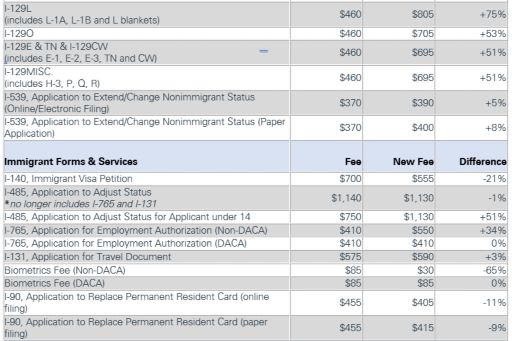United States – DHS Changes Filing Fees and Premium Processing Timeframe
US–DHS Changes Filing Fees&Premium Processing Timeframe
The Department of Homeland Security published a final rule on August 3, 2020, significantly increasing U.S. Citizenship and Immigration Services (USCIS) filing fees for cases postmarked after October 1, 2020. Also under the new rule, the premium processing timeframe will increase from 15 calendar days to 15 business days.

According to a final rule published by the U.S. Department of Homeland Security (DHS) in the Federal Register on August 3, 2020, new U.S. Citizenship and Immigration Services (USCIS) filing fees will be implemented for cases postmarked after October 1, 2020.1 The final rule increases fees by an average of 20 percent to help recover operational costs. Under the new rule, the premium processing timeframe will increase from 15 calendar days to 15 business days.
WHY THIS MATTERS
U.S. employers and employees may be significantly impacted by the changes related to the final rule, and are advised to budget accordingly. To the extent possible, employer and employees will want to file petitions and applications subject to fee increases so that they are postmarked before October 2, 2020.
Those filing petitions for premium processing should also prepare for the extended timeline that will take effect on October 2, 2020.
New Fees
Changes to the USCIS forms and services most commonly utilized by employers and employment-based applicants are summarized in the following chart.

Interestingly, USCIS has separated Form I-129 into form types for specific visa classifications, with different fees assigned to each form type. A standard filing fee of $460 currently applies to Form I-129, regardless of the corresponding visa classification. The new H-1 fee of $555 is 21 percent higher than the current fee, while the proposed fee of $805 for an I-129 filed in the L category reflects an increase of 75 percent.
Additional Fee Payment Required for Certain H-1B and L-1 Petitioners
If a petitioner employs 50 or more workers, and more than 50 percent of these workers are in H-1B, L-1A, or L-1B nonimmigrant status, that petitioner is generally required to pay an additional fee of $4,000 for each initial and change-of-employer H-1B petition, as well as $4,500 for each initial and change-of-employer L-1 petition. Under the new final rule published on August 3, 2020, the additional H-1B fee of $4,000 and the additional L-1 fee of $4,500 will apply to initial, change-of-employer, and extension petitions filed in the H-1B and L-1 categories by any employer with at least 50 employees, of whom more than 50 percent are in H-1B, L-1A, or L-1B status.
New Fees for Ancillary Benefits Associated with Form I-485, Application to Register Permanent Residence or Adjust Status
The current Form I-485 fee for an adult between 14 and 79 years of age is $1,225. This fee covers Form I-485 itself, as well as any initial and renewal applications for an Employment Authorization Document (EAD) and/or Advance Parole (AP) based on a pending I-485 application. The new rule requires I-485 applicants to pay USCIS a fee of $550 for an EAD and $590 for AP starting October 2, 2020. There is no obligation for an I-485 applicant to apply for an EAD or AP, however, most applicants do.
New Premium Processing Timeframe
The final rule extends the premium processing timeline from 15 calendar days to 15 business days, thus allowing USCIS an additional one week within which to act on a filed petition.
The final rule does not increase the current premium processing fee of $1,440, however, it does suggest that DHS may bypass the formal rulemaking process when announcing future premium processing fee increases.
Updates to Biometric Fees
Under the final rule, the separate biometric collection fee of $85 that currently applies to Forms I-485, I-539, and N-400 is eliminated and incorporated into the base fee applicable to each form. The biometrics fee of $85 will apply to Deferred Action for Childhood Arrivals (DACA) applicants. The final rule also requires a biometrics fee of $30 to be paid by those applying for Temporary Protected Status (TPS), individuals filing a motion, appeal, or benefits request with the Executive Office of Immigration Review (EOIR), and applicants for employment authorization who are seeking asylum or withholding of removal.
Impact on Asylees, Persons Seeking Withholding of Removal, and “Dreamers” under DACA
Effective October 2, 2020, an application for asylum or withholding of removal will now cost $50. This fee will be refunded to successful applicants who then apply for U.S. permanent residence.2 As mentioned above, persons seeking asylum or withholding of removal will also be required to pay a biometric fee of $30 when submitting an I-765 application for employment authorization, along with an application fee of $550 for the I-765.
The final rule does not impose a fee on individuals applying to extend protection under DACA, but DACA beneficiaries requiring employment authorization will still pay more fees to USCIS due to the recent announcement that they must now apply for an EAD annually instead of every two years. (For prior coverage, see GMS Flash Alert 2020-336 (31 July 2020).)
KPMG NOTE
USCIS is primarily funded by filing fees. The agency is currently seeking emergency government funding of $1.2 billion, which is the budgetary shortfall that USCIS claims it has experienced due to low filing volume. USCIS contends that a furlough of 13,000 employees will be necessary to address the shortfall unless the emergency funding is provided. As of the date of this newsletter, the furlough is scheduled to take effect on August 31, 2020. Since the new fees will not be implemented until October 2, 2020, it is unclear what bearing they would have on the request for emergency funding or the planned furlough. On July 31, 2020, USCIS confirmed in a news release that the continued application of current fees would leave the agency underfunded by approximately $1 billion per year.3
KPMG Law LLP is carefully monitoring any additional guidance or updates related to the final rule published by DHS on August 3, 2020. We will endeavor to keep readers of GMS Flash Alert posted on any important developments as and when they occur.
FOOTNOTES
1 See the Federal Register for the final rule, “U.S. Citizenship and Immigration Services Fee Schedule and Changes to Certain Other Immigration Benefit Request Requirements,” published August 3, 2020.
2 For the USCIS announcement on DACA employment authorization, click here.
3 To read USCIS’s July 31, 2020 news release on the fee increase, click here.
VIEW ALL
* Please note that KPMG LLP (U.S.) does not provide any immigration or labor law services. However, KPMG Law LLP in Canada can assist clients with U.S. immigration and labor matters.
The information contained in this newsletter was submitted by the KPMG International member firm in Canada.
SUBSCRIBE
To subscribe to GMS Flash Alert, fill out the subscription form.
© 2025 KPMG LLP, a Canada limited liability partnership and a member firm of the KPMG network of independent member firms affiliated with KPMG International, a Swiss entity. All rights reserved.
KPMG International Cooperative (“KPMG International”) is a Swiss entity. Member firms of the KPMG network of independent firms are affiliated with KPMG International. KPMG International provides no client services. No member firm has any authority to obligate or bind KPMG International or any other member firm vis-à-vis third parties, nor does KPMG International have any such authority to obligate or bind any member firm.
GMS Flash Alert is a Global Mobility Services publication of the KPMG LLP Washington National Tax practice. The KPMG name and logo are trademarks used under license by the independent member firms of the KPMG global organization. KPMG International Limited is a private English company limited by guarantee and does not provide services to clients. No member firm has any authority to obligate or bind KPMG International or any other member firm vis-à-vis third parties, nor does KPMG International have any such authority to obligate or bind any member firm. The information contained herein is of a general nature and is not intended to address the circumstances of any particular individual or entity. Although we endeavor to provide accurate and timely information, there can be no guarantee that such information is accurate as of the date it is received or that it will continue to be accurate in the future. No one should act on such information without appropriate professional advice after a thorough examination of the particular situation.
